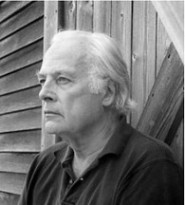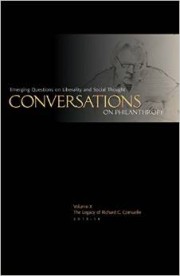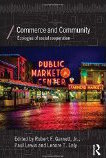Consequentialism and Philanthropy: The Legacy of a Revolutionary
Insofar as civility—the virtue of the citizen—requires disinterested interest in what is right not for the direct benefit of the individual but for the country, the generosity of philanthropy achieves significance far beyond that of charity. After all, to allow freedom of speech and freedom of association is to be extraordinarily philanthropic, because to do so is in principle to tolerate what one may not approve of out of fidelity to the appreciation and cultivation of what it means to be human.
—Steven Grosby, “Philanthropy and Human Action,”
Conversations on Philanthropy VI, 2009
Our first and foremost purpose is to affirm the moral commitments of parents, young persons, neighbors, and citizens, to affirm the importance of the communities within which such commitments take shape and are transmitted from one generation to the next. This is not primarily a legal matter. On the contrary, when a community reaches the point at which these responsibilities are largely enforced by the powers of the state, it is in deep moral crisis.
—Amitai Etzioni, The Spirit of Community, 1993
The nation has become economics-obsessed and politics-obsessed, and has pushed these disciplines far beyond their limits. And today, America suffers from a sickness that economic analysis cannot clarify and political action cannot cure. Having come perilously close to viewing society and state as identical, we are trying vainly to force economics and politics to do the work of elemental social reform.
As government has increasingly monopolized the public business, the role of the citizen has been dangerously diminished. Citizenship once meant more than voting—it meant direct, personal, hands-on involvement in the common concerns of the community.”
—Richard Cornuelle, Healing America, 1983
Community is not an act of will that can be induced by persuasion or exhortation. Community is a consequence.
—Richard Cornuelle, “De-Nationalizing Community,” Philanthropy, 1996
Early in De-Managing America, Richard Cornuelle raises the questions of how life in America really works, what we know about it, and how we can make it better. He expresses his admiration for the resilience of people, and makes clear his desire to confront myths he previously accepted as truth. Then he writes, “And in the process, I came to believe completely in the indomitability of the human spirit. I feel a powerful force pushing us inexorably toward a good society—the steady urgent pressure of men and women straining to be human, to discover and express all the things they can be. And although I can’t prove it, I believe the things straining for fuller expression are good things—warmth, understanding, loving-kindness, creativity, laughter” (1975, 6).
As we explore Cornuelle’s books and papers, we are reminded repeatedly of this optimism, of this sense of a powerful force pushing us toward the good society through what is good in individuals. If we examine Cornuelle’s wrestling with the practical applications of optimism, we better understand that he was interested in consequences, in what we are creating in our work together. This legacy shows his struggle against ideologies, orthodoxies, and labels; he wants to engage citizens in actions that transcend the particular alignments of parties or factions and which transform the structures and systems he found so stultifying. His thinking about generosity, about human potential, and about the future revolves around shared benefit. Only insofar as the term invited exploration would he have accepted a label which included an “ism.” This essay is an attempt to trace the evolution of the work around social change which Cornuelle viewed as revolutionary.
Of a Revolution
From his early writings to his “tracking” of emergent, vital, voluntary action as described by Lenore Ealy (2009), 1 Cornuelle sought to clarify the social processes through which we discover and express civility. As a self-styled revolutionary and social critic, he describes the failures not only of government programs but also of foundations and charities that were trying to ameliorate social inequities. More importantly, he grapples with the assumptions and language framing the arguments and the policies. Especially in “New Work for Invisible Hands” (1991), he writes eloquently about the damage done by taking economic theory on faith and applying that theory to the associational and social spheres of human activities. In Reclaiming the American Dream, he writes of the failures of applying market solutions to public problems (1993 [1965], 185) and in Healing America, of the failure of economic and political thinkers to appreciate the full importance of personal relationships (1983, 142). These comments may seem confusing, but they are juxtaposed to illustrate the evolution of Cornuelle’s thought.
Cornuelle admires Jane Jacobs’ The Death and Life of Great American Cities (1993), for her observation of the real social life on a street and its “intricate network of voluntary controls.” This is how things actually happen in real life, not in an abstract theory about that life. (It is interesting to note that Cornuelle did not seem to succumb to the pessimism that Jane Jacobs expressed in her final book, Dark Age Ahead, although his writing was consistently resonant with her thinking.) Like Elinor Ostrom, Cornuelle wants to know how people work together to manage their own resources and knowledge. He wants to know about the outcomes of association, and how association is sustained over time. Although he named “the independent sector” early in his writings, he grew away from the sector view and toward an understanding of the interdependence of all aspects of voluntary human endeavor. Our question then becomes, what is the legacy of a revolutionary who is confident in the capacities of fellow revolutionaries but not in the revolution itself?
If the “revolution” Cornuelle described in De-Managing America was not merely the replacing of authority but the transformation of personal responsibility and shared associational life, then evidence of that revolution should appear in every form of public life. Later, in Healing America, Cornuelle makes a statement that seems vividly applicable today, “I believe there is building in America a new silent plurality—a growing group who believe that our complaints are organic and beyond the reach of politics as we now practice it. More and more of us are sensing that our country is in a kind of trouble that cannot be cured by conventional political action, but by its unfamiliar opposite—by de-politicising, or demanaging, a society that has outgrown its present structures and is not working” (1983, 151).
Among the several themes raised in that paragraph, pluralism occurs repeatedly in his other writings. In the Afterword to Reclaiming the American Dream, for example, Cornuelle writes, “The leaders of the charitable subsector hold out a vision of a comfortable future in the arms of the state, but pluralism becomes pretense when one sector of a professed pluralistic polity becomes dependent on another. A chastened, captive, and obedient pluralism is worse than no pluralism at all” (193). Earlier in the book he reflected briefly on the decline of American pluralism, and while asking for a history of this phenomenon to be written, he expressed his suspicion that the deterioration began as a result of the policies of Woodrow Wilson. Pluralism is important in Cornuelle’s thinking because it indicates opportunity for learning and for outcomes accessible only through association. As Peter Drucker wrote, “But all earlier pluralist societies destroyed themselves because no one took care of the common good. They abounded in communities but could not sustain community, let alone create it” (1999, 1).
In “De-Nationalizing Community,” Cornuelle later expands on this thinking:
The drive to nationalize community had produced a society that was badly out of balance, misshapen, its central government grossly overgrown, and its capacity for concerted local and voluntary action severely underdeveloped, atrophied. The once proudly pluralistic society where initiative was widely diffused, diversity was celebrated, monopoly thought bad and choice thought good, where fixing what seemed to be wrong with the society was a game any number could play, had become the opposite. I expect it was at about this time that we began to talk about giving people a “sense” of community because opportunities for real and rewarding involvement in community affairs were disappearing (1996, 11).
This loss of pluralism and of the engagement in community affairs also has roots in the ascription of authority to experts—be they politicians, economists, or service professionals. Expert knowledge is segmented and isolated. Furthermore, indicators, metrics, and aggregates are proxies for reality, and Cornuelle was eloquent about the dangers of applying the contrivances of market analyses to social and public life. As the technologies of experts become policy, each separate sphere of expertise must defend itself—and its funding—against the whole. As we have sadly seen with foundations, the assessment of risk becomes the priority in any such defense. Whereas others extolled efficiency as the goal and justification of processes, Cornuelle wrote, “Management which manages by specifying results is emancipating. It opens to all the possibility of inventiveness and resourcefulness. It is a way of depoliticizing the management process. It is highly productive, because it tends to release the full potential of people, rather than some predetermined and necessarily deformed fraction of that potential” (1975, 100-101).
This form of consequentialism, the releasing of the full potential of people through association which unites effort to achieve a specific result, is a key theme for Cornuelle. It is also a theme that is constantly reinforced by Cornuelle’s colleagues Ivan Illich and John McKnight. Both speak of the disabling co-opting of our capacities by professionals, institutions, and government; sometimes they write with outrage, often with righteous indignation, and always with a sense of command that we can and should do better. Each of the three reflects upon the purposes of our public institutions and the meaning, or lack thereof, that we find as we act within and on behalf of those institutions. As Cornuelle chose “De-Managing” and “Reclaiming” in his titles, Illich (1971) used “DeSchooling” and John McKnight (1977) referred to “Disabling” Help. The resonance among the three writers is important; they share a preoccupation with human capacity or potential, with our individual and social competence, and with what Grosby (2009) called civility. Each of the three wants to undo the damages done to individual human beings, to political life, and to our shared future.




